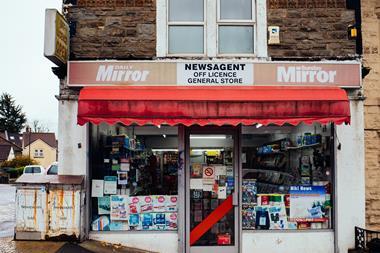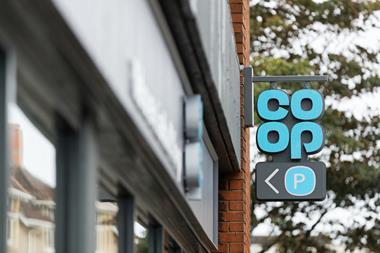Kit Kats. He likes Kit Kats. We know what Gordon Brown thinks about tax, the free market economy, child poverty. And we are fast learning about his green aspirations. But as the new PM prepares this week to lead the country for the first time, our knowledge of his attitude to the food and drink industry appears, at first glance, to be limited to a popular confectionery item.
Short of the customary excise duties on beer, wine, spirits and tobacco, he's never given a speech on the food and drink industry. Small shops have received no support whatsoever from Brown. The Competition Commission is out of his hands. And with Iraq, the NHS and education at the top of his agenda, it's arguable that our industry, with all its squabbles and concerns, simply isn't on his radar. "We don't think the food industry is a priority," says a senior government affairs expert at a major multinational food manufacturer. "He doesn't have any strong feelings towards our industry or any particular expertise in it."
But with obesity, inflation and the environment all at the centre of Labour policy, the Cabinet reshuffle is certain to have ramifications for grocery. Brown has hinted at a shake-up of the DTI and Defra, and another corporate affairs insider at a multinational supplier is concerned at the potential for confusion. "If food technology finds itself in a new department that also deals with food safety or finance, there may be a shift of emphasis."
As well as structural changes, Brown will want to stamp his own style on the new Cabinet and to put his closest allies into positions of power. Exactly who he will appoint is hard to predict at this stage (though we've given it our best shot on p32) and as lobbyists, government and corporate affairs experts and senior executives prepare to 'Brown-nose', they may find it hard going, says Graham McMillan, chief executive at public affairs company Open Road.
In the first place - and unlike Tony Blair - Brown "likes taking a lot of time, doing a long analysis, then presenting his views. He only had two announcements a year to make as Chancellor; now, as PM, he will have 12 big decisions a day. He may struggle with that."
Since an early steer on policy direction is vital in helping companies plan ahead - for example, in the areas of commercial packaging waste and the labelling of carbon footprints - it will be essential that the industry develops relationships with Brown and his closest advisers. But this will not be particularly easy as they are "a much closer clique", McMillan warns. "He will only have about 10 people in his policy unit and they won't be as easy to get to know as the Blair equivalents, who were more outgoing. Obviously the food and drink industry will be dealing with the secretaries of state, but the key contacts will be in the policy unit, and only people like Tesco CEO Sir Terry Leahy will get to Brown and his advisers."
An understanding of Brown's background is also instructive. Growing up around poverty, child welfare has become a personal crusade, and his resolve has only been strengthened since he became a father, says McMillan. "There will be no rowing back from the current advertising policies of Ofcom and the FSA regarding 'junk food'. Brown wants to be seen to be on the side of children so he will want these policies to continue, and may tighten them."
In the Daily Mail last year Brown appeared to suggest that under his Premiership the government would do more to get the nation off its backside. Recalling his own sprightly performances on the rugby field, and looking ahead to the 2012 Olympics, Brown promised to restore school sports to its proper place in the curriculum, offering four hours of sport every week by 2010 in every school, and an annual Sports Day, rejecting the "once fashionable idea that competitive team sports are not the right way for our children". He also promised "practical lessons about healthy food should form a bigger part of the primary curriculum and we should promote the new option of domestic science in secondary schools that will soon be available to all pupils".
So far so good. But Brown refers extensively to the "increasing availability of poorly labelled fatty junk foods, sometimes aggressively marketed to children". "Parents need better information about the fats, sugars and salt in the food supermarkets sell. We need new agreement to upgrade labelling across food products in all the major stores. And food companies must play their part, with a responsible attitude to food advertising." Brown suggests this should include "a voluntary ban on advertising unhealthy foods near schools, and a self-denying ordinance about TV advertising of junk food during programmes children watch".
Dean Greasley, marketing manager at Zetar, which owns Kinnerton Confectionery, is worried Brown's government may go even further: "We are concerned Brown will stop children's characters appearing on products altogether."
Another vexed issue for the industry is competition. It is clear that this avowed free marketeer is grateful to the multiples for their constraining influence on inflation during his 10-year period as Chancellor, and small shopkeepers will not expect any favours. The current planning White Paper making its way through Parliament had Brown's fingers all over it. "It was the Treasury, under Brown's leadership, that pushed for changes to planning policy [that are expected to] undermine the town centre first approach," says James Lowman, chief executive of the ACS. "We hope that as PM he will take a broader view and resist a push from the biggest retailers to weaken it."
Inflation remains a threat, however. Kevin Hawkins, director-general of the BRC, is concerned about its impact. "Recent increases in interest rates are already damaging growth, rents have been going up above inflation and we've had 27% growth in the national minimum wage since October 2003. There is also the possibility of business rates going up under the Lyons review of how local authorities fund economic projects."
This leaves Brown with a balancing act. The conventional view is that he is more sympathetic to the unions, but McMillan believes, with a general election not far off, Brown "can't afford to move away from the centre ground" and is committed to keeping inflation in check. Greg Lawless at Teather & Greenwood believes that in a bid for populist measures, "Brown will concentrate on domestic issues". That may mean an extra bank holiday, more maternity leave and childcare, but the big idea is as likely to be encouraging business to be greener.
Such a move will, inevitably, worry an industry burdened by red tape. Hawkins fears green concerns will be another excuse for unwieldy legislation. "We need to ensure there's no gold-plating of regulations on climate change and carbon emissions. Brown should work on the principle that voluntary action from industry makes sense, and we will deliver the goods. We don't need new forms of bureaucracy, targets, checking and inspection. Let's just get on with it."
But Hawkins rejects the idea that Brown will be bad news. "After 10 years at the Treasury, he is keen to see productivity growth. He understands the importance of wealth creation - he won't be able to fund investment in public services without it."nBrown's agenda: our predictions
Unions: not as friendly towards them as you may think. Expect incentives around childcare rather than hard cash
Crime: will stick with the Asbo policy but less fervently than Blair
Red tape: he created most of it; no sign he will move away from regulation
Health: expect tougher rules on advertising and marketing of food to children
Competition Commission: he gave it extra powers and independence so is likely to stick with its recommendations
Planning: another review he supports, particularly to help big business grow
Sustainability: he is not a tree hugger like David Cameron, but saving the planet, and improving the lot of developing countries, is high on his list. Expect more green initiatives
Tax: has gone quiet on national insurance hikes, but expect other stealth tax increases the shape of the cabinet
Politicians seem to have taken over from professional nutritionists and dieticians as arbiters of healthy foodstuffs. I fear there is little prospect that the clamour from Westminster on what they regard as wise for us to eat will subside in the slightest. I believe it will increase. Mr Brown, being son of the manse, has a more Puritan streak about him than Tony Blair, and therefore the present "nannying" may possibly get even more intense.
How this is reflected at Cabinet level is hard to say, but I am going to stick my neck out, and predict:
1Health: The received wisdom at Westminster is that Patricia Hewitt will be among the first ministers to have her collar felt. My guess is that she could be replaced as health secretary by Brown's favourite, Ed Balls, economic secretary to the Treasury, a man who has played the biggest role (other than Brown himself) as a Treasury civil servant, and latterly a minister, in the compilation of Budgets over the past 10 years. He is inevitably a Chancellor in the making, but his parliamentary experience is so far too limited to give him that job just yet. If he becomes health secretary he will continue the policy of frowning on 'junk food', but I doubt he will feel it right to go to the lengths of some campaigners, which is to refuse NHS treatment, under certain conditions, for obese people and those who will not give up smoking. Nor is it likely Brown will be entirely happy with junior minister Caroline Flint's proposal to put health warnings on alcoholic drinks, believing it is a step too far, so she is another one likely to go.
2Environment: David Miliband may well hang on as Environment Secretary, one of whose jobs will be to ensure that farmers get a fair price for the milk they sell to supermarkets - an issue that is never going to go away. Cracking down on excessive packaging will also be high on his to-do list, although he is more likely to favour self-regulation than issue directives to persuade companies to reduce waste.
3Culture, Media and Sport: The importance of exercise is a key message that the industry wants to get across. But Tessa Jowell, who is becoming unnaturally enthusiastic about the 2012 Olympic Games, may remain as secretary of state. Regarded as the ultimate at "nannying", she is thought to feel the Ofcom strategy to reduce the effect of 'junk food' commercials on children does not go far enough. Harriet Harman, justice minister and a candidate for the deputy Labour leadership, has also voiced opposition to the "bombardment" of 'junk food' commercials.
4Education: Another candidate for the deputy leadership, Alan Johnson, if he retains his post as education secretary, will be anxious to continue the work of the School Food Trust, although so far he has shown no appetite to address inconsistencies. He won't want to introduce even more rules and regulations for schools, though.
5Treasury: The most obvious choice for Chancellor is Alistair Darling, currently trade and industry secretary. He has vast Cabinet experience and possesses the political virtue of being a boringly safe pair of hands and a master of detail.A fairer deal for scotland. oH really?
The Scottish National Party minority government has received a fairly warm welcome from business.
During the campaign the SNP promised it would form a business-friendly government and this was underlined by new First Minister Alex Salmond's initial speech in parliament, when he said: "Creating a more entrepreneurial Scotland and promoting sustainable economic growth will be our overwhelming priority."
The retail sector is key to the administration's economic growth aspirations, so plans to cut business rates are welcome, particularly for small businesses, says Scottish Retail Consortium director Fiona Moriarty.
Details of the changes for 2008 will be known in the autumn, but the SNP has promised to remove 120,000 small businesses from rates altogether, giving a boost to convenience stores and small food and drink manufacturers. The party also plans an increase in rate relief for a further 30,000 companies, costing an extra £150m a year, to help free resources to invest in training and marketing.
But the new administration is not without its downsides. Early actions will include raising the age for purchasing tobacco products to 18. After consultation with the SRC and business, the new government will introduce this on October 1 in line with the rest of the UK.
The new government also wants to increase action to stop alcohol abuse by the young and has promised to apply restrictions on alcohol price promotions, that come into force in the on-trade in 2009, to supermarkets and the off-trade as well. It has warned of tough policing of the rules.
Even more controversially, the SNP manifesto proposed strengthening the supermarkets code of conduct with an independent regulator.
It intends to address what it describes as the "imbalance in power between the big supermarkets and producers at the bottom of the supply chain".
The SNP will not allow the multi-national supermarkets to exploit suppliers, it warns, but does intend talking with supermarkets to develop a better relationship with the rest of the supply chain.
The SRC has admitted it is "nervous" about the proposed changes.
Salmond is clearly intending to come down hard on big retailers and favour smaller operators instead.
Local food sourcing and the provenance of Scottish products are very much in the spotlight. The SNP has announced there will be minimum requirements for procurement of local and healthy fresh produce by the public sector and by supermarkets. The policy is also supported by the Lib Dems, so should have no problem gaining parliamentary approval.
One plan that is a much greater flashpoint, however, is the intention to cut off support for two new major transport infrastructure projects.
Ministers have ordered a full re-examination of the costs of the Edinburgh Airport Rail Link and Edinburgh Trams projects, on which more than £100m has already been spent.
Businesses have warned that cancelling the schemes will be detrimental, especially to the Scottish capital's retail sector, which has struggled in recent years. The early decision to abolish tolls on the Forth Road Bridge, likely to take effect early next year, will, say critics, increase congestion in and around Edinburgh.
Preliminary discussions between Scottish Executive officials and the major supermarket groups over the proposals began in late May.
n In Wales, there is also the possibility the nationalists could gain a share of power. Plaid Cymru is still in discussions with the minority Labour government over forming a coalition. It has been pushing for greater business rate relief, which has proved a sticking point to agreement so far, and also wants to ensure 80% of publicly procured food is locally sourced.


















No comments yet